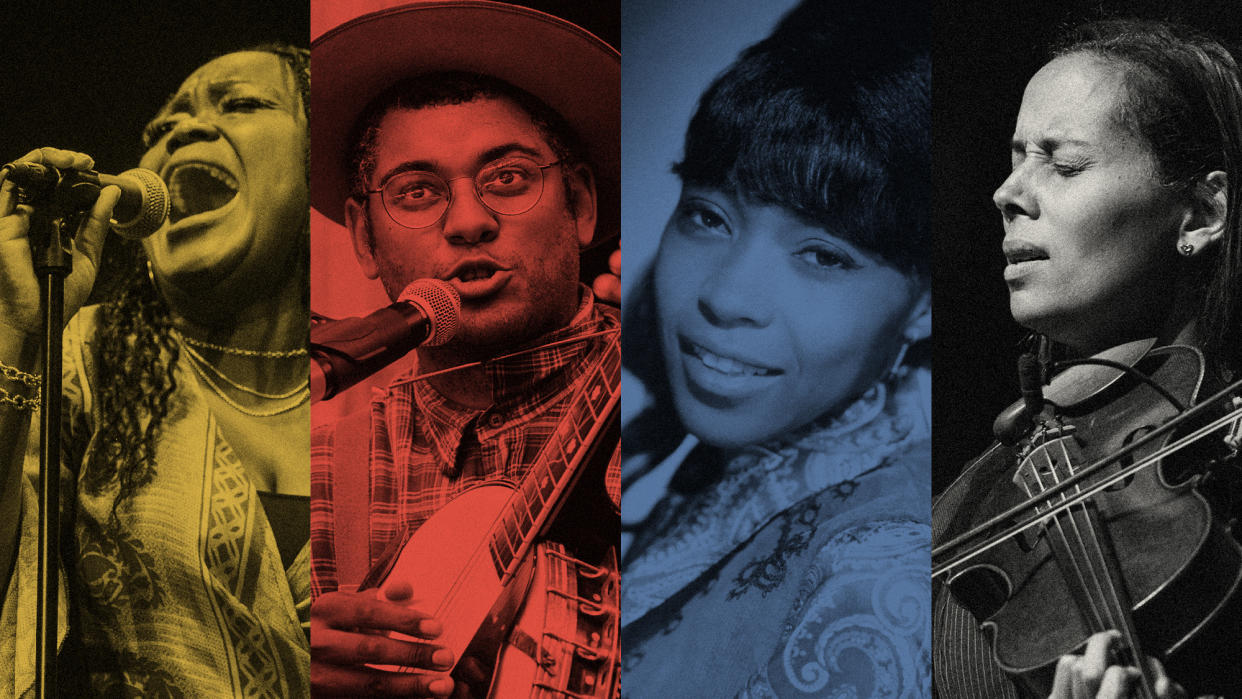8 genre-defining Black country, folk and blues musicians

Black country, folk and blues musicians have always been vital to the genres' very American, very long legacies. The all-powerful Beyoncé, with her latest album, "Cowboy Carter," has shined a sharp spotlight on some of those artists. But there are boundless musicians from these genres worth celebrating. Here are a few, from the mid-20th century to today.
Shemekia Copeland
Copeland's voice is legendary. She can wail about love gone sideways like few others. But the daughter of blues musician Johnny Copeland also applies the blues to a broad swath of topics, solidifying her musical prowess. On her 2020 album, "Uncivil War," she "is not content to merely sing blues fodder about love gone wrong: 'Clotilda's On Fire' chronicles the horrors — and lasting impact — of slavery; 'Walk Until I Ride' is a contemporary civil rights manifesto … and 'Money Makes You Ugly' is a protest song for environmentalists," said DownBeat.
Dom Flemons
A one-time member of the Carolina Chocolate Drops with Rhiannon Giddens, Flemons plays a battery of instruments from the folk and country genres. He is also a folk archivist and music historian who enjoys collaborating with other musicians. His 2023 album, "Traveling Wildfire," continues to "honor the past while underscoring its relevance to the present — and keeping an unflinching eye on the future," said the roots-music resource No Depression.
Linda Martell
The country music industry was not ready for Linda Martell when she debuted her country album, "Color Me Country," in 1970. The single "Color Me Father" was a hit. But when Martell played the Grand Ole Opry — the first Black woman to do so — she was heckled and called the n-word. Still, she remembers the era with wistful fondness. "That was a time and a half," she said to Rolling Stone in 2020, years before Beyoncé gave Martell her flowers multiple times on "Cowboy Carter." "Don't get me wrong. There were some beautiful people. And some not that beautiful."
The Pointer Sisters
You may know The Pointer Sisters from their R&B blockbusters such as "I'm So Excited" and "Neutron Dance" during the early 1980s. Well, before they crested the charts, they had a country hit with "Fairytale." Then a "Grand Ole Opry appearance, the first by a Black vocal group, followed despite a hate-fueled protest outside the Ryman Auditorium," said Wide Open Country. The song won the group a Grammy.
Precious Bryant
"Listening to Bryant's music, you'll hear a blend of the traditional fingerpicking that has come to be associated with musicians from the Piedmont region mixed with the electric sounds of Mississippi artists like Elmore James, Jimmy Reed and Muddy Waters," said Valerie Turner in Acoustic Guitar. Bryant was born in Georgia in the 1940s and, as Turner noted, her influences were broad. She knew how to work a crowd. See her rope 'em in with "Fool Me Good."
Fantastic Negrito
"Rolling Through California" is a prime example of the way this West Coast-born musician engages with his world. "Someone said it's the happiest climate change song ever," Fantastic Negrito said to KQED. "I thought that it was really appropriate to be celebratory, and to be optimistic about the challenges that we have to face, because at least we're alive here and hopefully healthy to face them." His music runs across genres, from blues to funk to hip-hop, and his fondness for his home base of Oakland, California, is infectious.
Rhiannon Giddens
Opera singer; violist; fiddle and banjo player; actor; ballet and opera composer: Giddens has her fingers all over contemporary American culture. One example of her admirable swerves: She played Hallie Jordan in the TV series "Nashville" in 2017 and 2018; a few years later she won the Pulitzer Prize for the opera "Omar" she wrote with Michael Abels. Her "versatility suits her wide-ranging interest in U.S. history — the treatment of enslaved and indigenous peoples, the culture of immigrant communities, civil rights — as she seeks to challenge its present," said the Financial Times.
Reyna Roberts
"I was worried about the stigma of being a black woman in country," Roberts said in a 2020 interview with Rolling Stone. "But after thinking about it, and having the encouragement of my parents, and others, I realized that I need to go after what I love: country music." And oh, has she, appearing on Monday Night Football multiple times and enlisting the praise of singers like Carrie Underwood.
